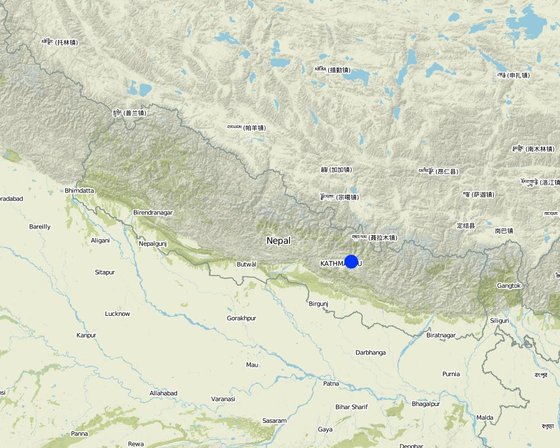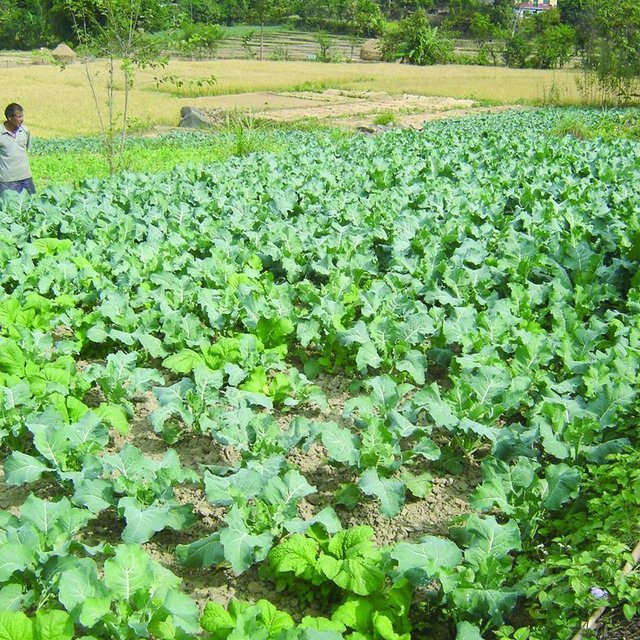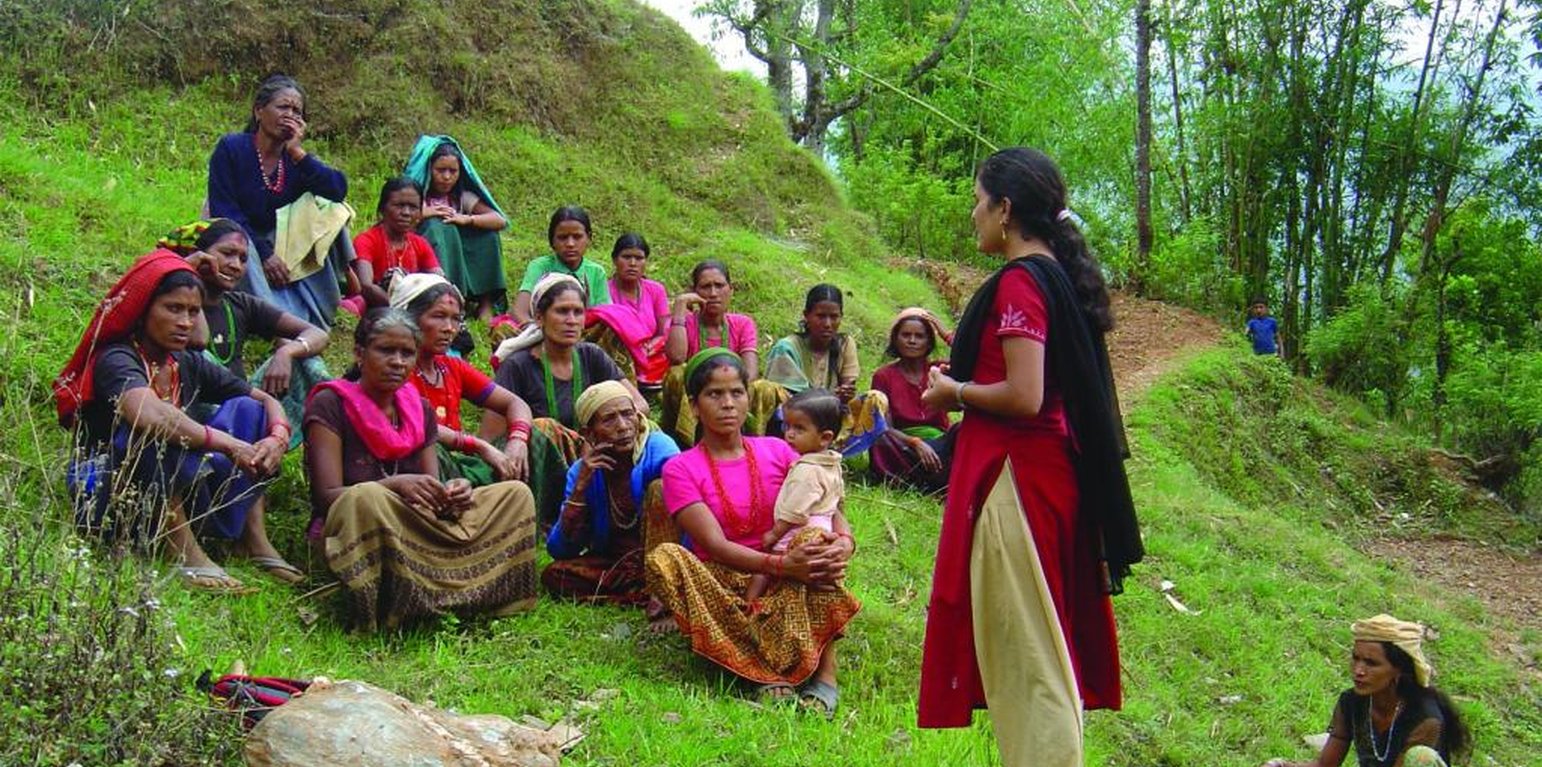Farmer-led experimentation
(Непал)
Krishak ko aguwai ma garine parikshan (Nepali)
Описание
Participatory technology testing and adaptation through farmer-led experiments
Farmer-led experimentation is a type of action research initiated and carried out by farmers in their own fields. This approach enables farmers to identify technological options suited to local agroecological and socioeconomic conditions. The farmer-led experimentation process is taken up within existing farmer groups. This approach is closely related to the 'participatory innovation development' and the 'participatory technology development' approaches as discussed in Kolff et al. (2005). Simple experiments are usually replicated in five to ten farmers' fields per group. Generally, the whole of each experimental plot from each field is harvested and the yield recorded. Field implementation, group visits, and observations are carried out by the farmers themselves. The processing of results is done in groups together with the support staff from the facilitating organisation. These farmers are very likely to adopt tested technologies that are shown to be better for meeting their needs. The results are also used by support staff and shared with other organisations, and provide input for dissemination through farmer-to-farmer diffusion.
Farmers play a leading role in all steps of the process, starting from problem identification to planning, implementation, and evaluation of the experiments. This ensures that farmers are the driving force in the research process and not mere recipients of research findings that have been generated elsewhere. The detailed implementation plan is discussed within the groups and individual and collective responsibilities are assigned. The experimental site, individual implementing farmers, group visits, and results-sharing meetings are decided on by group consensus. Some observations are recorded by the implementing farmers. Promising innovations are then identified based on the collective evaluation of the tested treatments. Technical and other facilitation support is provided by organisations active in the area.
Местоположение

Местоположение: Midhills, Непал
Географическая привязка выбранных участков
Дата ввода в действие: н/п
Дата завершения: н/п
Тип Подхода
-
традиционная/ местная система землепользования, используемая коренным населением
-
недавняя местная инициатива/ инновация
-
в рамках проекта/ программы

Farmer-led experimentation on different cauliflower varieties (Juerg Merz)
Цели подхода и благоприятные условия для его реализации
Главные цели/ задачи Подхода
Local farmers collectively solving problems by identifying and using the most appropriate local solutions. Local farmers designing, testing and disseminating alternative technologies adapted to local conditions. Strengthening joint learning by farmers and development actors.
The SLM Approach addressed the following problems: The common issues concerning farmers in growing crops include pests and diseases, yield decline, inappropriate crop varieties, and the introduction of new varieties. Rather than technicians providing farmers with ready-made solutions to their problems (that may or may not work), farmer-led experimentation allows farmers to carry out their own trials to try and solve specific problems.
Условия, содействующие применению Технологии/ Технологий в рамках Подхода
Условия, затрудняющие применение Технологии/ Технологий в рамках Подхода
-
Наличие/ доступность финансовых ресурсов и услуг: Lack of money for technical support
Treatment through the SLM Approach: Collaborative approach amongst farmers from the same settlements
-
Институциональные условия: Dysfunctional government extension system
Treatment through the SLM Approach: Reliance on local human resources and farmer to farmer collaboration
-
Осведомленность в области УЗП, доступность технической поддержки: Problems related to agricultural production and soil fertility
Treatment through the SLM Approach: esting and adaptation of technologies to local conditions using local human and natural resources
Участие и распределение ролей заинтересованных сторон
Заинтересованные стороны, участвующие в реализации Подхода, и их роли
| Какие заинтересованные стороны/ организации-исполнители участвовали в реализации Подхода? |
Перечислите заинтересованные стороны |
Опишите роли заинтересованных сторон |
| местные землепользователи/ местные сообщества |
|
|
Участие местных землепользователей/ местных сообществ на разных стадиях реализации Подхода
нет
пассивное
внешняя поддержка
интерактивное
самоорганизация
инициирование/ мотивация
participatory discussions and exercises, field visits, farm maps, farming and labour calendar, Activities: Identification of topics for experiment based on needs and priority, Identification of technological options (indigenous and external), Farmers developing simple and appropriate experiments, De
выполнение
follow-up visits, discussions, Activities: Farmers implement according to the design for comparison with a control (= existing practice), Farmers note relevant observations on recording sheet. Farmers note other important observations based on their needs and interests, Technical support and discuss
мониторинг/ оценка
field visit to experimental site by other farmers, participatory discussion and evaluation Activities: Experimenting farmers and other farmers jointly discuss and evaluate based on direct observations of the trial and from the record sheet, Discussion on the lessons learned and identifying possible
Принятие решений по выбору Технологии УЗП
Решения принимались
-
исключительно землепользователи (по собственной инициативе)
-
в основном землепользователи при поддержке специалистов по УЗП
-
все участники как часть процесса совместных действий
-
преимущественно специалисты по УЗП после консультаций с землепользователями
-
исключительно специалисты по УЗП
-
политики/ руководители
Принятие решений было основано на
-
анализ подробно описанного опыта и знаний по УЗП (принятие решений на основе подтвержденных фактов)
-
результаты исследований
-
личный опыт и мнения (незадокументированные)
Техническая поддержка, повышение компетенций и управление знаниями
Следующие мероприятия или работы являлись частью Подхода
-
Повышение компетенций/ обучение
-
Консультационные услуги
-
Институциональная (организационная) поддержка
-
Мониторинг и оценка
-
Научные исследования
Повышение компетенций/ обучение
Обучение было предоставлено следующим заинтересованным лицам
-
землепользователи
-
местный персонал/консультанты
Тип обучения
-
в ходе работы
-
обмен опытом между фермерами
-
опытные участки
-
общие собрания
-
курсы
Институциональная поддержка
Какие институциональные структуры были укреплены или вновь созданы
-
нет
-
да, немного
-
да, умеренно
-
да, существенно
на уровне
-
местные
-
региональный
-
национальный
Опишите организацию, функции и ответственность, членство и т.д.
Тип поддержки
-
финансовая
-
повышение компетенций/ обучение
-
оборудование
Подробнее
Technical support provided by project
Мониторинг и оценка
bio-physical aspects were monitored by land users through observations
technical aspects were monitored by land users through observations
economic / production aspects were monitored by land users through observations
area treated aspects were monitored by land users through observations
land users involved aspects were monitored by land users through observations
management of Approach aspects were monitored by land users through observations
There were several changes in the Technology as a result of monitoring and evaluation: The adoption of certain technologies has occurred as a result of farmer-led experimentation. For example, a farmer-led trial of two varieties of groundnut (local and B4), in Ghadgaon, Surkhet, led to farmers starting to grow the B4 variety in an area where previously only local varieties had been growing
Финансирование и внешняя материальная поддержка
Годовой бюджет мероприятий по УЗП в долларах США
-
< 2000
-
2000-10000
-
10000-100000
-
100 000-1 000 000
-
> 1 000 000
Precise annual budget: н/п
Approach costs were met by the following donors: local community / land user(s) (local resources, labour, land): 50.0%; other (Dev. project(inputs, external resources)): 50.0%
Землепользователям были оказаны/предоставлены следующие услуги или меры стимулирования
-
Финансирование и внешняя материальная поддержка, предоставляемая землепользователям
-
Субсидии на отдельные затраты
-
Кредитование
-
Другие методы или инструменты стимулирования
Финансовая/ материальная поддержка, предоставленная землепользователям
Provided by the project for testing purposes
Анализ влияния и заключительные положения
Влияние Подхода
Нет
Да, немного
Да, умеренно
Да, существенно
Сумел ли Подход помочь землепользователям внедрить и поддерживать технологии УЗП?
Great impacts on soil fertility and yields have been reported after the adoption of sustainable soil management tested through farmer-led experimentation.
Did other land users / projects adopt the Approach?
Several farmers in the project area have started to do farmer-led experiments on their own, including on intercropping different vegetables and spices, and on urine application through drip irrigation
Основные причины, побуждающие землепользователей внедрять УЗП
Долгосрочная устойчивость мероприятий в рамках Подхода
Могут ли землепользователи самостоятельно (без внешней поддержки) продолжать применение того, что было реализовано в рамках Подхода?
Some farmers are implementing the approach on their own initiative. This is possible because of the low costs and limited technical requirements of the approach. Farmers exposed to the approach will be able to apply the approach again to problems that arise in their fields without the need to consult outside agencies.
Заключительные положения и извлечённые уроки
Сильные стороны: по мнению землепользователей
Сильные стороны: по мнению составителя или ответственных специалистов
-
The approach serves both as a local test for suitability and adaptation potential as well as for demonstrating an already tested technology.
-
Once farmers are exposed to the approach, they can apply it on their own initiative. This is possible because of the low costs and technical requirements of the approach.
-
Experiments are conducted on the basis of farmers' priorities and according to local conditions. This means that farmers develop ownership of the experiments and the derived results.
Слабые стороны/ недостатки/ риски: по мнению землепользователейвозможные пути преодоления
Слабые стороны/ недостатки/ риски: по мнению составителя или ответственных специалистоввозможные пути преодоления
-
Experiments are not carried out in a scientifically rigorous way and therefore only have limited scientific value for evaluating technologies.
if scientific proof is required, farmer-led experiments should be closely supported by technicians (per se not a farmer-led experiment anymore!)
-
Documentation of the activities and results for wider sharing is often poor and inadequate
clear guidelines are needed for documentation with clear instructions on what, when, and how to record important information. This is necessary so that the results can be more widely used.
-
In some cases a lack of research equipment for better documentation and observation inhibits better understanding.
Справочные материалы
Продолжительность применения Технологии: 19 февраля 2009 г.
Последнее обновление: 28 июня 2017 г.
Ответственные специалисты
-
Richard Allen (richkga@gmail.com) - Специалист по УЗП
-
Soil Management Directorate - Специалист по УЗП
-
Team Leader Sustainable Sustainable Soil Management Programme (SSMP) (ssmp@helvetas.org.np) - Специалист по УЗП
Полное описание в базе данных ВОКАТ
Документирование осуществлялось при участии
Организация
- HELVETAS (Swiss Intercooperation)
Проект
- Sustainable Soil Management Programme, Nepal (SSMP)
Ключевые ссылки
-
SSMP (2001) Implementation Guideline on Farmer Led Experimentation (in Nepali). Kathmandu: Sustainable Soil Management Programme: SSMP
-
Paudel, C.L.; Regmi, B.D.; Schulz, S. (2005) - Participatory Innovation Development - Experiences of the Sustainable Soil Management Programme:
-
..In Kolff, A.; van Veldhuizen, L.; Wettasinha, C. (eds) Farmer-centred Innovation Development - Experiences and Challenges from South Asia, pp. 109-126. Bern:: SSMP





